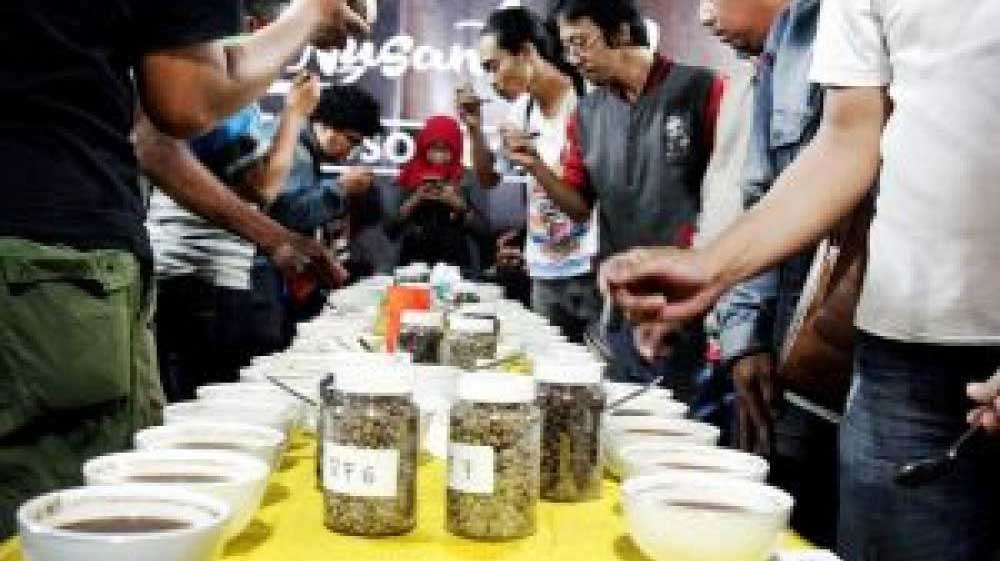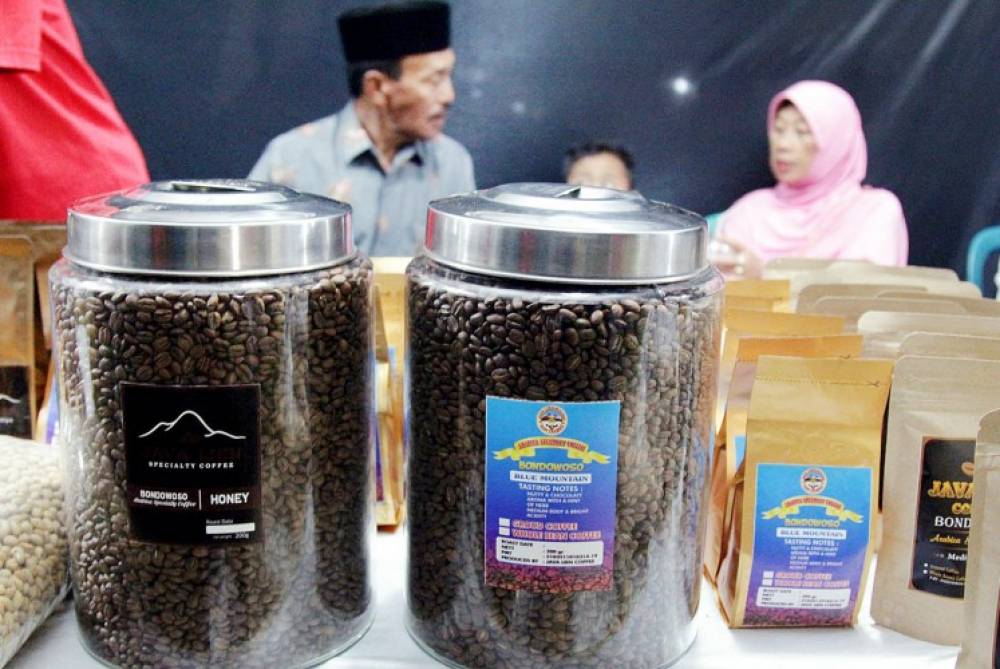Nusantara Coffee Festival in Bondowoso Coffee Republic
Coffee lovers can be any age. Local residents, young and old, crowded to try free coffee from 12 tester thermos bottles containing Robusta coffee from various provinces across the country during the 2nd Nusantara Coffee Festival in the town square of Bondowoso, East Java, in August.
They did not have to go all the way to Aceh to taste its world famous Gayo coffee or to Bali to sip the renowned Kintamani coffee. A diverse selection of coffee varieties were proudly displayed during the festival, which also brought together farmers, coffee farmers, coffee shop owners and trendy baristas.
<>Through the event, Bondowoso tried to popularize its adopted second name, the Republic of Coffee. In addition to coffee tasting, the city also organized coffee roasting, specialty, blending and brewing competitions as well as latte art demos and jazz music. <p">The prominence of young people indicated the commodity’s rising popularity, especially within the downstream sector with the growth of coffee shops and product diversification.
Within the upstream sector, many farmers also believe coffee production is making headway. One of them, Hadi Wijaya, 27, displayed various Arabica coffee beans from Bondowoso at his booth.
Hadi comes from the Ijen Raung Java Coffee Cluster plot, which was developed by the local administration on the land of state-owned forestry company Perhutani.
“Formerly, we only grew and harvested the crop before it was handed off to middlemen. Now, we can process it ourselves,” he said, adding that he was now capable of completing post-harvest handling as well as fermenting and roasting.
Hadi’s enthusiasm may have been aroused by the success of Mat Husen, a first-generation coffee farmer who was trained and supported by the Bondowoso administration to export local coffee to other countries. Mat Husen is today becoming increasingly famous for his Mat Coffee.
An air of optimism prevailed during a dialogue between officials, association members and coffee farmers at the festival’s Meet and Greet program. Nearly all collaborating parties joined the discussion, including the Bondowoso regent, the plantations director general, Sustainable Coffee Platform of Indonesia (SCOPI), Specialty Coffee Association of Indonesia, Coffee and Cacao Research Center in Jember and farmer group members.
Bondowoso is a success story in the development of farmers’ cooperation by utilizing Perhutani’s land. Regent H. Amin Said Husni said he was very proud of the power of coffee to assemble and unite officials, farmers and businesspeople. Last year on May 22, he declared Bondowoso the Republic of Coffee during the 2016 Ijen Festival.
The term Republic, he said, was meant to imply sovereignty.
“Investments are allowed but they should focus on farmers’ welfare, rather than just profit making. For instance, Saudi Arabia is interested in Robusta, and has requested at least 300 hectares. I welcome the bid, on the condition the farmers’ well-being is upheld” he said.
Bondowoso’s coffee exports account for a third of its production, leaving the rest for the domestic market.
Bambang, the directorate general of plantations at the Ministry of Agriculture, said he supported the collaboration between Perhutani and the coffee farmers, saying it was in line with President Joko “Jokowi” Widodo’s expectations.
“Forest land in combination with coffee agriculture creates benefits and contributes to environmental conservation,” he said, adding that the demand for coffee on the world market continued to grow, reaching around 9 million tons and rising by 300,000 tons annually.
Currently, the country can produce around 640,000 tons of beans. Of the total output, 96 percent is contributed by farmers, so the support of different parties is needed.
Veronica Herlina, executive director of SCOPI, also affirmed her focus on farmers’ welfare. At the end of the festival, SCOPI provided training for 60 participants from 15 provinces who aspired to become master trainers who would possess the skills to train coffee farmers.
The free coffee savored by locals during the festival’s opening had been entered into the specialty category contest for Robusta and Arabica coffees. The ten best entries were selected from 132 regions. The Arabica winners were Toraja, North Sulawesi; Samboga, Bandung; Prigen, Pasuruan; Kelendung, Temanggung; Kaliwining, Banjarnegara; Ijen Raung, Bondowoso; Flores Bajawa, Ngada; Bumiaji-Batu, Malang; Bowongso, Wonosobo and Bandung.
The top ten Robusta entrants were Wonotunggul, Batang; Wewena, Southwest Sumba; Tani Maju 3, Bondowoso; Maesan, Bondowoso; Kandangan, Temanggung; Kalipucang, Tutur; Bangumudal, Pemalang; Wonotunggal, Batang; Sapuran, Wonosobo and Dampit, Malang.
Premium coffee was not developed overnight in Bondowoso. The administration has written a book chronicling the farmers and officials’ journey, titled Bondowoso Republik Kopi.
Bondowoso has been inseparable from the country’s coffee history since the 19th century when the regency was part of the Besuki Raya Plantation, the produce of which was known globally as Java Coffee.
Part of the Bondowoso region, often described as a highland paradise, is a mountainous area, which sits at an altitude of 500-1000 meters above sea level, suitable for the growth of Arabica, the premium coffee variety.
Amin said that since 2010 his administration had given serious support to farmers in the Mount Raung and Ijen zone, especially in Sumberwringin district, to develop the Arabica coffee cluster. Training and facilities were provided, including fertilizer and seedlings, with the target of boosting coffee production and developing agro-tourism.
The regency also cooperated with the Coffee and Cacao Research Center and secured some capital aid from Bank Indonesia and Bank Jatim. In 2011, the farmers’ coffee production was assessed as export worthy. Through PT Indokom, the first export went to Switzerland, totaling 186 tons. In 2013, this cluster received a Geographic Indication certificate from the Law and Human Rights Ministry as the patent for the Java Ijen Raung Arabica Coffee Cluster brand.
Coffee production increased to 1,500 tons in 2015. Of the total, 800 tons were exported at a sale value of around Rp 48 billion (US$3.6 million). With increasing production and the size of plantations, which reached 13,000 hectares last year, Bondowoso coffee seems to be on the right track to make a name for itself as part of the word’s coffee culture.
Source: “Nusantara Coffee Festival in Bondowoso coffee republic” by Luh De Suriyani for the Jakarta Post. Published on September 12, 2017 (http://www.thejakartapost.com/life/2017/09/12/nusantara-coffee-festival-in-bondowoso-coffee-republic.html)


